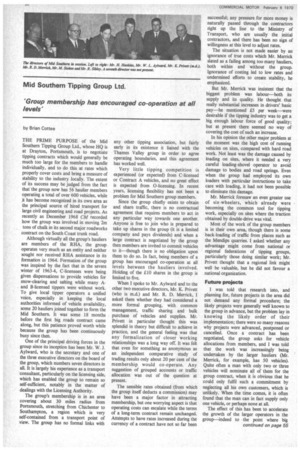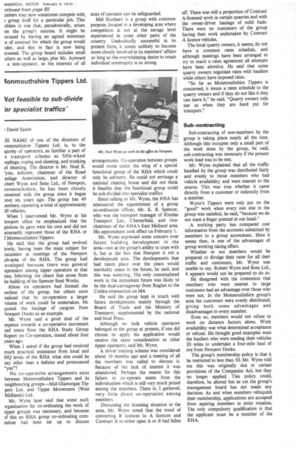Mid Southern Tipping Group Ltd.
Page 52

Page 57

If you've noticed an error in this article please click here to report it so we can fix it.
"Group membership has encouraged co-operation at all
by Brian Cottee THE PRIME PURPOSE of the Mid Southern Tipping Group Ltd., whose HQ is at Drayton, Portsmouth, is to negotiate tipping contracts which would generally be much too large for the members to handle individually, and to do this at rates which properly cover costs and bring a measure of stability to the industry locally. The extent of its success may be judged from the fact that the group now has 56 haulier members operating a total of over 600 vehicles, while it has become recognized in its own area as the principal source of hired transport for large civil engineering and road projects. As recently as December 1968 CM recorded how the group was involved in moving 2m tons of chalk in its second major roadworks contract on the South Coast trunk road.
Although virtually all the group's hauliers are members of the RHA, the group operates very much as an entity and neither sought nor received RHA assistance in its formation in 1964. Formation of the group was inspired by the fact that in the severe winter of 1963-4, C-Licensees were being given dispensations to provide vehicles for snow-clearing and salting while many Aand B-licensed tippers were without work. To give local tipper operators a unified voice, especially in keeping the local authorities informed of vehicle availability, some 20 hauliers joined together to form the Mid Southern. It was some 18 months before the first big roads contract came along, but this patience proved worth while because the group has been continuously busy since then.
One of the principal driving forces in the group since its inception has been Mr. W. J. Aylward, who is the secretary and one of the three executive directors on the board of the group, which numbers seven directors in all. It is largely his experience as a transport consultant, particularly on the licensing side, which has enabled the group to remain so self-sufficient, notably in the matter of dealings with the Licensing Authority.
The group's membership is in an area covering about 30 miles radius from Portsmouth, stretching from Chichester to Southampton, a region which is very self-contained from a transport point of view. The group has no formal links with any other tipping association, but fairly early in its existence it liaised with the Thames Valley group in order to agree operating boundaries, and this agreement has worked well.
Very little tipping competition is experienced (or expected) from C-licensed or Contract A vehicles, and no great effect is expected from 0-licensing. In recent years, licensing flexibility has not been a problem for Mid Southern group members.
Since the group chiefly exists to obtain and share traffic, there is no contractual agreement that requires members to act in any particular way towards one another. Anyone is free to join who is prepared to take up shares in the group (it is a limited company and pays dividends) and when a large contract is negotiated by the group then members are invited to commit vehicles to it—though there is no obligation upon them to do so. In fact, being members of a group has encouraged co-operation at all levels between the hauliers involved. Holding of the £10 shares in the group is limited to five.
When I spoke to Mr. Aylward and to the other two executive directors, Mr. K. Privett (who is m.d.) and Mr. R. D. Merrick, I asked them whether they had considered a more formal grouping, with common management, traffic sharing and bulk purchase of vehicles and supplies. Mr. Privett in particular thought this was splendid in theory but difficult to achieve in practice, and the general feeling was that any formalization of closer working relationships was a long way off. It was felt that even for something as anonymous as an independent comparative study of trading results only about 20 per cent of the membership would co-operate. Any suggestion of grouped accounts or traffic allocation was out of the question at present.
The sensible rates obtained (from which the group itself deducts a commission) may have been a major factor in attracting membership, but one worrying aspect is that operating costs can escalate while the terms of a long-term contract remain unchanged. Attempts to have rates increased during the currency of a contract have not so far been successful; any pressure. for more money is naturally passed through the contractors right up the line to the Ministry of Transport, who are usually the initial contractors, and there has been no sign of willingness at this level to adjust rates.
The situation is not made easier by an ignorance of true costs which Mr. Merrick slated as a failing among too many hauliers, both within and without the group. Ignorance of costing led to low rates and undermined efforts to create stability, he emphasized.
But Mr. Merrick was insistent that the biggest problem was labour—both its supply and its quality. He thought that really substantial increases in drivers' basic pay—he mentioned £5 per week—were desirable if the tipping industry was to get a big enough labour force of good quality; but at present there seemed no way of covering the cost of such an increase.
In his opinion the other major problem at the moment was the high cost of running vehicles on sites, compared with hard road work. Not least was the damage caused by loading on sites, where it needed a very careful loading-shovel operator to avoid damage to bodies and road springs. Even when the group had employed its own loaders with particular instructions to take care with loading, it had not been possible to eliminate this damage.
Mr. Merrick foresaw an even greater use of six-wheelers, which already were becoming the common tool for tipping work, especially on sites where the traction obtained by double-drive was vital.
Most of the work of the group members is in their own area, though there is some back-loading of traffic from places such as the Mendips quarries. I asked whether any advantage might come from national or regional federations of tipping groups, particularly those doing similar work; Mr. Privett thought that a regional link might well be valuable, but he did not favour a national organization.
Future projects
I was told that research into, and planning for, future projects in the area did not demand any formal procedure; the likely projects were generally well known to the group in advance, but the problem lay in knowing the likely order of their implementation; there were so many reasons why projects were advanced, postponed or cancelled. Once a contract has been negotiated, the group asks for vehicle allocations from members, and I was told that the work was increasingly being undertaken by the larger hauliers (Mr. Merrick. for example, has 50 vehicles). Quite often a man with only two or three vehicles will nominate all of them for the group contract, when it is obvious that he could only fulfil such a commitment by neglecting all his own customers, which is unlikely. When the time comes, it is often found that the man can in fact supply only one vehicle, or perhaps none at all.
The effect of this has been to accelerate the growth of the larger operators in the group—indeed to • the point where big continued on page 55 :imbers may now sometimes compete with group itself for a particular job. This oblern is one that, paradoxically, arises mn the group's success. It might be eviated by having an agreed minimum :e of contract for which the group would rider, and this in fact is now being scussed. The group board includes small niliers as well as large, plus Mr. Aylward a non-operator, so the interests of all sizes of operator can be safeguarded.
Mid Southern is a group with common purpose, located in a developing area where competition is not at the savage level experienced in some other parts of the country. Undoubtedly successful in its present form, it seems unlikely to become more closely involved in its members' affairs so long as the overwhelming desire to retain individual sovereignty is so strong.


















































































































































